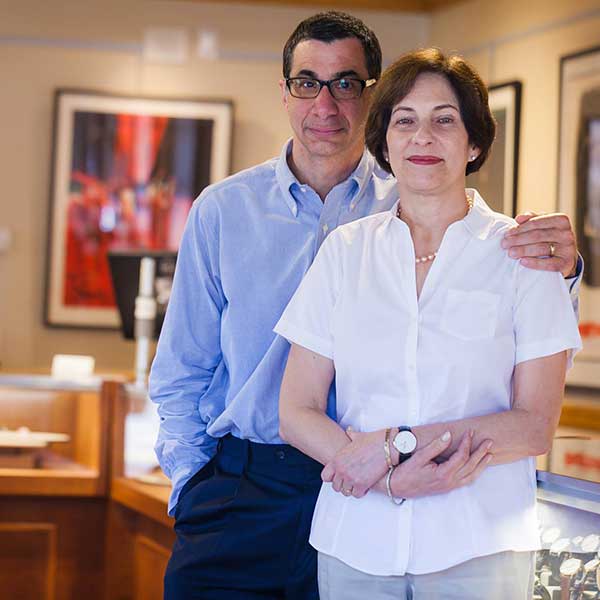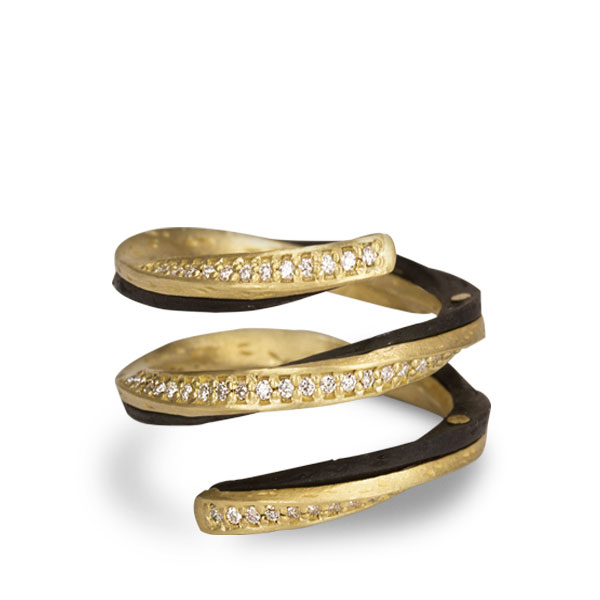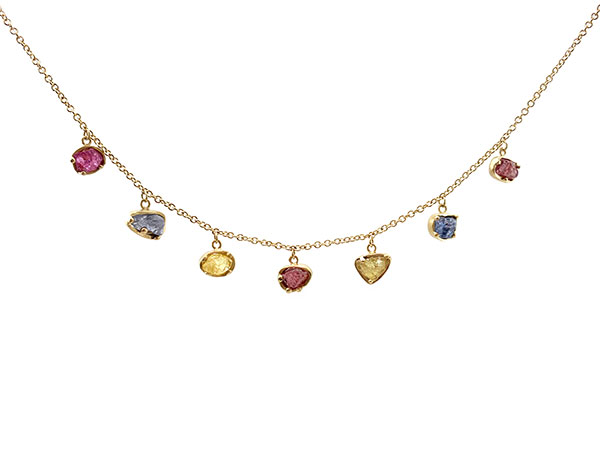
Bob Goodman, the third-generation owner of Robert Goodman Jewelers in Zionsville, Ind., hates public speaking, but he isn’t shy about speaking his mind. “For the last eight to 10 years, we’ve had as part of our DNA to talk about politics and religion with our customers,” he says. “Obviously, we are very liberal. We encourage people who don’t agree with us to talk to us, as long as they’re civil.”
Goodman and his wife, Rose-Marie—the only two employees of their literal mom-and-pop shop—are committed to supporting LGBTQ rights, the Black Lives Matter movement, and other progressive issues. But it wasn’t until they met a jewelry designer passionate about responsible sourcing—with an emphasis on gold—that they decided to embark on a mission to promote sustainable jewelry.
With the help of consultant Christina T. Miller, the Goodmans now work with a handful of sustainable designers—including Sarah Graham, Judi Powers, Russell Jones, Toby Pomeroy, and Shimell and Madden—whom they promote on a dedicated section of their website. In addition to using low-waste studio practices and certified recycled materials, the companies vow to source newly mined materials with minimal harm to the environment. Below, Goodman reflects on how he began his journey into ethical gold sourcing, and why he believes it’s the best way to reach a new demographic.

How did you start down the road to sustainability?
It’s been about four to five years. During the JCK show, I’d made contact and had a couple phone conversations with Jennifer Dawes. We made an appointment to go see her, and that was our entry into sustainable and ethical sourcing. Jennifer is one of the trailblazers in the industry. She introduced us to it, and we agreed that this was a space we wanted to occupy.
Did you worry that it would cost you a lot of money to be sustainable or that it might be hard to explain the extra costs to customers?
Any retailer that says that is bull—-. Because that same retailer may be carrying Rolex and Seiko, and they don’t have a problem distinguishing between a Swiss and Japanese watch movement. They never talk about how to justify the difference in price points. They’re just making excuses as to why they don’t want to support ethical gold sourcing. If you’re selling bridal and you have Mark Patterson from California and someone manufacturing in China, how do you justify the difference in cost? You just do. There’s no difference between saying, “This piece is ethical, and this piece is made with Fairmined gold.”
You work with a handful of designers who use Fairmined gold, including a few who’ve become Fairmined licensees at your request. How did those conversations go?
Our focus in the last four, five, six years has become small and medium independent designers. Once we get involved with them, if they’re not Fairmined, we ask them if they’d buy Fairmined gold to produce our stuff in, or if they’ll become a licensee. I’ve been turned down by a couple of people, not because they didn’t believe in the mission but because they didn’t feel it would fit their direct-to-consumer clientele.

And how do customers respond to your sustainable gold jewelry?
It depends on the client. When you talk about it and you can tell immediately it’s not resonating with the customer, we’re cool, we don’t have a problem with that. But if they like the designer, we just focus on the designer and the pieces they like. We don’t worry about trying to turn them. The purchase just becomes an additional benefit. You have to be aware if you’re resonating or not and if not, you just walk away.
Why is it important to you to offer sustainable gold jewelry?
Part of our journey down this road is because our research has told us we’re the only jeweler in the state of Indiana going down this journey and taking it honestly and transparently. When you walk around the shows, you see sustainable and ethical all over the place. But 99% are just saying it. If I go in and quiz them about their metal, all they can tell me is it’s just recycled.
Being sustainable fits our core values, but we also believe it’s a way to talk to a younger demographic. None of us have figured how to speak to them—it’s the $10,000 question: How the hell do you communicate? And we believe sustainability is a way to communicate with them.
Rose-Marie and I also believe there’s a significant enough percentage of the demographic we’re talking about who cares about this, and it will resonate. These individuals are very savvy, receptive and will pick up immediately through your social media and face-to-face visits whether or not you’re showing them a load of crap.
Follow JCK on Instagram: @jckmagazineFollow JCK on Twitter: @jckmagazine
Follow JCK on Facebook: @jckmagazine